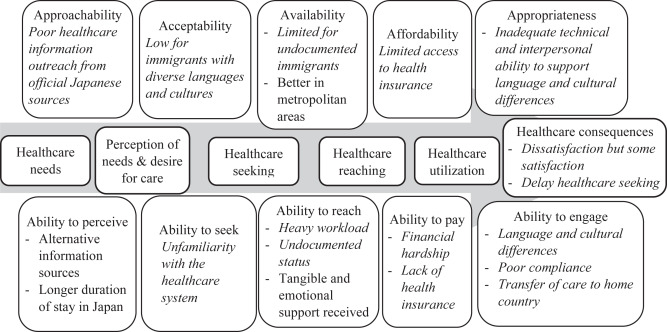RESEARCH REPORT 2025.01.10
論文「日本における在留外国人の医療アクセスに関する障壁と促進要因:混合研究法を用いた系統的レビューとメタ統合」がアクセプトされました。The article「Barriers and facilitators for healthcare access among immigrants in Japan: A mixed method systematic review and meta-synthesis」was accepted.
Yu Par Khinさんの論文「日本における在留外国人の医療アクセスに関する障壁と促進要因:混合研究法を用いた系統的レビューとメタ統合」がThe Lancet Regional Health – Western Pacificにアクセプトされました。
https://authors.elsevier.com/sd/article/S2666606524002700
(書誌情報)
Khin YP, Owusu FM,Nawa N*, Surkan PJ, Fujiwara T. Barriers and facilitators for healthcare access among immigrants in Japan: A mixed method systematic review and meta-synthesis. The Lancet Regional Health – Western Pacific. 2024; (in press)
【タイトル】
日本における在留外国人の医療アクセスに関する障壁と促進要因:混合研究法を用いた系統的レビューとメタ統合
【背景・目的】
日本では国民皆保険制度が整備されているが、在留外国人の医療アクセスには障壁がある可能性がある。さらに、在留外国人の医療アクセスに関する体系的な研究は十分ではない。本システマティックレビューでは、日本における在留外国人の医療アクセスに関する障壁と促進要因を検討することを目的としている。
【方法】
2024年1月9日までに発表された英語および日本語の文献を検索した。Levesqueのフレームワークに基づき、在留外国人の医療アクセスの各ステージに影響を及ぼす要因を評価した研究を対象とした。さらに、主題分析を行い、結果の分類を行った。
【結果】
2,791件の論文を精査した結果、量的研究40件、質的研究23件、混合研究4件の合計67件の研究が特定された。限られた医療情報により、在留外国人は代替の情報源を求めるようになり、移民の医療ニーズの認識に影響を与えた。また、滞在期間が長くなるほど、医療情報へのアクセスが改善された。文化や医療制度の違いが医療の受診に影響を与えた。過重労働、無登録の滞在、経済的困難、保険の制約により医療へのアクセスや利用が妨げられたが、家族や友人の支援はこれを促進する要因となった。医療制度は、在留外国人の言語や文化的なニーズをサポートするには不十分であることが多く、その結果、満足度やコンプライアンスの低下につながることが明らかになった。
【結論】
本研究の結果は、医療情報へのアクセス改善から在留外国人に配慮した医療制度づくりに至るまで、日本の在留外国人を支援するための多角的なアプローチの重要性を浮き彫りにしている。また、無登録の滞在者や低技能労働者としての在留外国人、子どもなど、特に脆弱な立場にある在留外国人の医療アクセスに関しては、さらなる研究が求められる。
The article by Dr. Yu Par Khin「Barriers and facilitators for healthcare access among immigrants in Japan: A mixed method systematic review and meta-synthesis」was accepted at The Lancet Regional Health – Western Pacific.
https://authors.elsevier.com/sd/article/S2666606524002700
Citation:
Khin YP, Owusu FM,Nawa N*, Surkan PJ, Fujiwara T. Barriers and facilitators for healthcare access among immigrants in Japan: A mixed method systematic review and meta-synthesis. The Lancet Regional Health – Western Pacific. 2024; (in press)
Background: While Japan provides universal healthcare, immigrants may experience hampered access to healthcare. A comprehensive review of immigrant healthcare access is also lacking. This systematic review aims to examine barriers and facilitators of healthcare access among immigrants in Japan.
Methods: We searched for literature published in English and Japanese until January 9, 2024. Studies were included if they assessed factors influencing any stage of immigrants’ healthcare access, such as perceiving needs, seeking, reaching, utilizing healthcare and the consequences of healthcare, as defined by the Levesque framework. We performed a thematic analysis to further identify categories.
Findings: After screening 2,791 articles, we identified 67 studies (40 quantitative, 23 qualitative, 4 mixed methods). Limited healthcare information led immigrants to seek alternative information sources whereas longer duration of stay improved access to healthcare information. Cultural and healthcare system differences affected healthcare seeking. Reaching and utilizing healthcare were hindered by heavy workloads, undocumented status, financial hardship, and limited insurance but were facilitated by support from family and friends. The healthcare system was often insufficient to support immigrants’ language and cultural needs leading to dissatisfaction and poor compliance.
Interpretation: Findings highlight the critical importance of a multidimensional approach to support immigrants in Japan, ranging from improving healthcare information access to creating immigrant-friendly health systems. More research is needed on the healthcare access among vulnerable immigrants, such as undocumented and low-skilled labor immigrants and children.

Figure: Barriers and facilitators that immigrants in Japan face to access healthcare according to the Levesque conceptual framework of healthcare access. (Barriers are focused with italic text).
